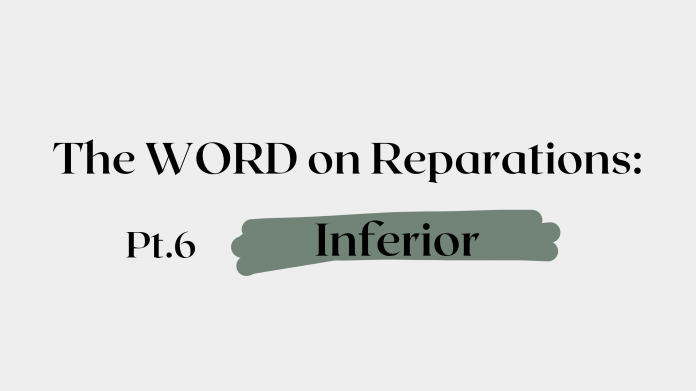Inferior.
Ding, ding, ding.
Dinner’s over and America is almost done with her meal: capitalism served on the backs of enslaved Africans — with a side of selective memory.
But before America pulls out a crumpled implicit bias training or a tattered DE&I program to pay the bill, should we tell her how much her meal really cost?
The Commission to Study and Develop Reparation Proposals for African Americans, lying dormant in the recently re-introduced Congressional Act H.R. 40, will prepare the check America needs to see before she can pay the slavery bill in full.
For nearly 250 years, Black people were enslaved — shackled, beaten, whipped, tortured and subjugated to countless violent and abhorrent acts for the benefit of white Americans. Then they were freed — not because America suddenly recognized them as people, but because the freedom of enslaved Black Americans was an instrument in a war scheme. Thrown into a society replete with hatred for their being and disdain for their humanity, Black people endured another century of state-sanctioned degradation and discrimination. To this day Black Americans must live with inequity in the form of generational loss (the leftovers of slavery and segregation) and active racism (served fresh daily across the country).
We’d think, then — having since regarded this as a rotted, disgusting part of our history — Americans would be eager to engage in a robust conversation about compensating this group of people through their living descendants. But when given the opportunity to engage in reparative strategies that might compensate the descendants of these Black individuals — or that might mitigate the impact slavery and its ancillary brethren of segregation, discrimination and vitriolic racism — conversations freeze.
Why have we continued to dilute the experience of enslaved Black people, positing them as mere martyrs of their time, rather than acknowledging the violently dehumanizing reality of their experience?
The enduring belief in Black inferiority.
You see, Black inferiority was the lie America told herself as she sucked her thumb and created exploitative capitalist structures at the cost of Black lives. America thought to herself: “If we argue that Black people are biologically inferior to white people, lie about Black peoples’ intellectual capabilities and fallaciously state that their physical traits are an indicator of their bestial nature, we can feel better about subjecting them to this treatment.”
Black inferiority was then cooked up to justify the institution of slavery.
“Okay, but why do we always have to talk about slavery? It was so many years ago! It’s over and done!!” Yes, of course, slavery “ended” (but let’s not forget that exception for crime in the 13th Amendment to the U.S. Constitution), but not only was its inception the result of a flagrant lie about the inferiority of Black individuals, our refusal to discuss its cataclysmic impact on Black Americans further engenders this fallacy of Black inferiority.
That theory of Black inferiority, kept fresh by our government’s refusal to accept its role in slavery, has been left free to snake throughout history, planting itself in the systems that construct the sociopolitical frameworks that dictate the confines of our socioeconomic environments.
This means that any attempt to use the legal system — or our governmental framework generally — to advance reparative strategies will never work because these very systems have yet to denounce Black inferiority. If you think of me as an inferior, second-class citizen, you’ll never see me as worthy of respect, dignity, appreciation or humanity — much less reparations.
This is what The Commission to Study and Develop Reparation Proposals for African Americans embedded in H.R. 40 seeks to accomplish. Tasked with fundamentally addressing the violent cruelty associated with slavery, the Commission seeks to understand the role our government played in perpetuating the dehumanizing institution, the ways in which the institution of slavery and its lingering effects have impacted Black Americans today and ways through which this understanding can be communicated to Americans today.
Only after all of this foundational research and fundamental work does the Commission then seek to write the check, recommending appropriate remedies to address America’s wrongs. Any legal approach to reparations on municipal and state levels must mirror such an approach. Reparative strategies will remain unsuccessful, and our legal framework will be unable to advance such strategies unless they are intentionally preceded with a denouncement of the myth of Black inferiority.
Nicky Agyevi-Armah is a 3L at the Law School. She graduated from the University of Maryland in 2018 with a bachelor’s degree in government and politics. She currently sits as president emerita of the Student Bar Association, the Law School’s student government and, through that role and many others, remains committed to equity, justice and ultimate liberation. Email Nicky at nsagyeviarmah@email.wm.edu

